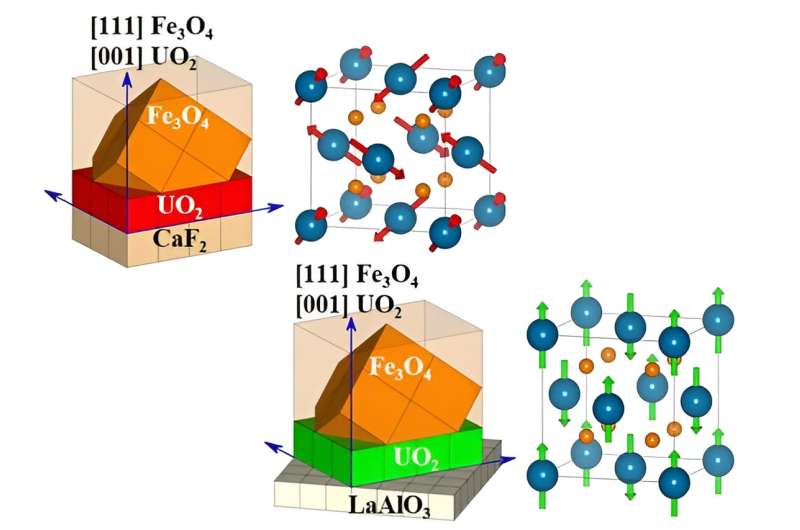
[ad_1]

The material is transformed into another structure by applying a surface tension imposed by the substrate layer. Credit: Vienna University of Technology
Electronics are based on moving electric charges from one place to another. Electrons move, current flows, and signals are transmitted by applying electrical voltage. However, there is another way to connect electronic currents and signals: using the properties of spin—the intrinsic magnetic moment of the electron. This is called “spintronics” and has become an increasingly important field in contemporary electronic research.
An international research team comprising TU Vienna and the Czech Academy of Sciences has now achieved a significant breakthrough. They have been able to change the spin in an antiferromagnetic material using surface tension. This could lead to an important new line of research in electronic technologies. Here is the research. published In the journal Advanced functional materials.
“There are different types of magnets,” explains Sergey Khmelevsky from the Vienna Scientific Cluster Research Center, TU Wien. “The most well-known is ferromagnetism. This occurs when the atomic spins in a material are aligned in parallel. But in contrast, antiferromagnetism also occurs. In an antiferromagnetic material, neighboring atoms always have opposite spins. ” So their effects cancel each other and not. Magnetic force can be detected from outside.
“However, in 2010, scientists from TU Wen and the Czech Academy of Science proposed the idea that such antiferromagnetic materials have promising properties for spintronic applications,” says Khmelevskyi. This was the beginning of the new research field of “antiferromagnetic spintronics” which has developed rapidly since then.
The Czech Academy of Sciences and the Institute of Physics of the Ecole Polytechnique (Paris), TU Wien, have recently done intensive work. The biggest challenge was that antiferromagnetic materials are difficult to manipulate—but finding a way to connect them reliably and precisely was critical. Just in case Magnetic states It becomes possible to fabricate computer memory cells (eg MRAM) that can be switched from one state to another in a targeted manner.
Magnetic frustration: small effects make all the difference.
Ferromagnets are easy to manipulate: applying an external magnetic field is sufficient to affect their intrinsic magnetic properties. This is not possible with antiferromagnets—but there is a way around it: you can work with surface pressure.
However, this requires a special type of crystal. Depending on the geometry and arrangement of atoms in the crystal, several different antiferromagnetic spin arrangements may be possible. The crystal occupies the state with the lowest energy. But this can be the case when many different spin orders have the same energy. This phenomenon is called “magnetic pessimism”. “In this case, small interactions, which would otherwise play no role, can decide which magnetic state the crystal adopts,” says Khmelevskyi.
Experiments with Uranium dioxide It has been shown Mechanical stress can be used to compress Crystal lattice A little bit, and that’s enough to change the magnetic configuration of the material.
“We have now shown that antiferromagnets can actually be converted using the magnetic frustration properties present in many known materials,” says Khmelevskyi. “This opens the door to many exciting further developments in the functional direction. antiferromagnetic Spintronics.”
More information:
Evgenia A. Tereshina-Chitrova et al, Strain-driven switching between antiferromagnetic states probed by the exchange bias effect in the frustrated antiferromagnet UO2, Advanced functional materials (2023). DOI: 10.1002/adfm.202311895
Provided by
Vienna University of Technology
Reference: Spintronics research shows that the magnetic state of certain materials can be changed by surface excitation.html
This document is subject to copyright. No part may be reproduced without written permission, except for any fair dealing for the purpose of private study or research. The content is provided for informational purposes only.
[ad_2]


